Dr. Dana Marsh, Professor of Music in Early Music/Voice and Chair of the Historical Performance Department at Indiana University’s Jacobs School of Music, joins us for this episode of The Beautiful Thinkers Podcast. In our conversation, Dr. Marsh provides thought-provoking insights into the theme of polarity within the music world, exploring the balance between tradition and innovation, the complexities of historical performance, and the evolving landscape of the music industry.
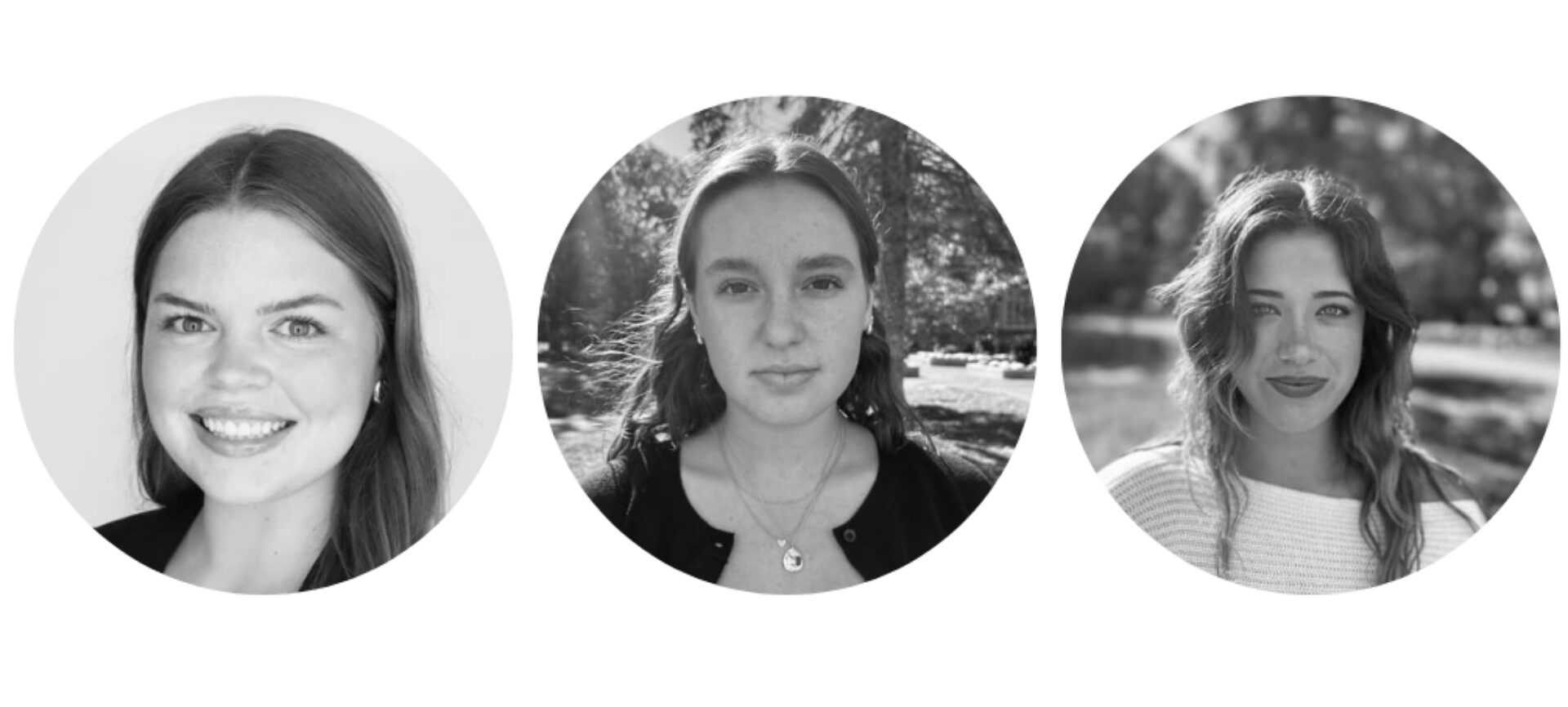
Grace Sheely, Emily Hook, Bella Grimaldi
“It could be any production that you're involved in is always going to involve different perspectives, different people, different personalities, different styles that all need to sort of come together and operate sort of on the same frequency.” -Dr. Dana Marsh
Carolyn Hadlock:
Today we are speaking with Dr. Dana Marsh at the Historical Performance Institute at Indiana University at the Jacob School of Music in Bloomington, Indiana. Dr. Marsh, it's wonderful to have you. Welcome to the show.
Dana Marsh:
It's a pleasure to be here. Thank you so much.
Bella Grimaldi:
Your education at Oxford and your early career at Salisbury Cathedral are institutions deeply rooted in historical traditions. How did these unique environments shape your understanding of historical performance?
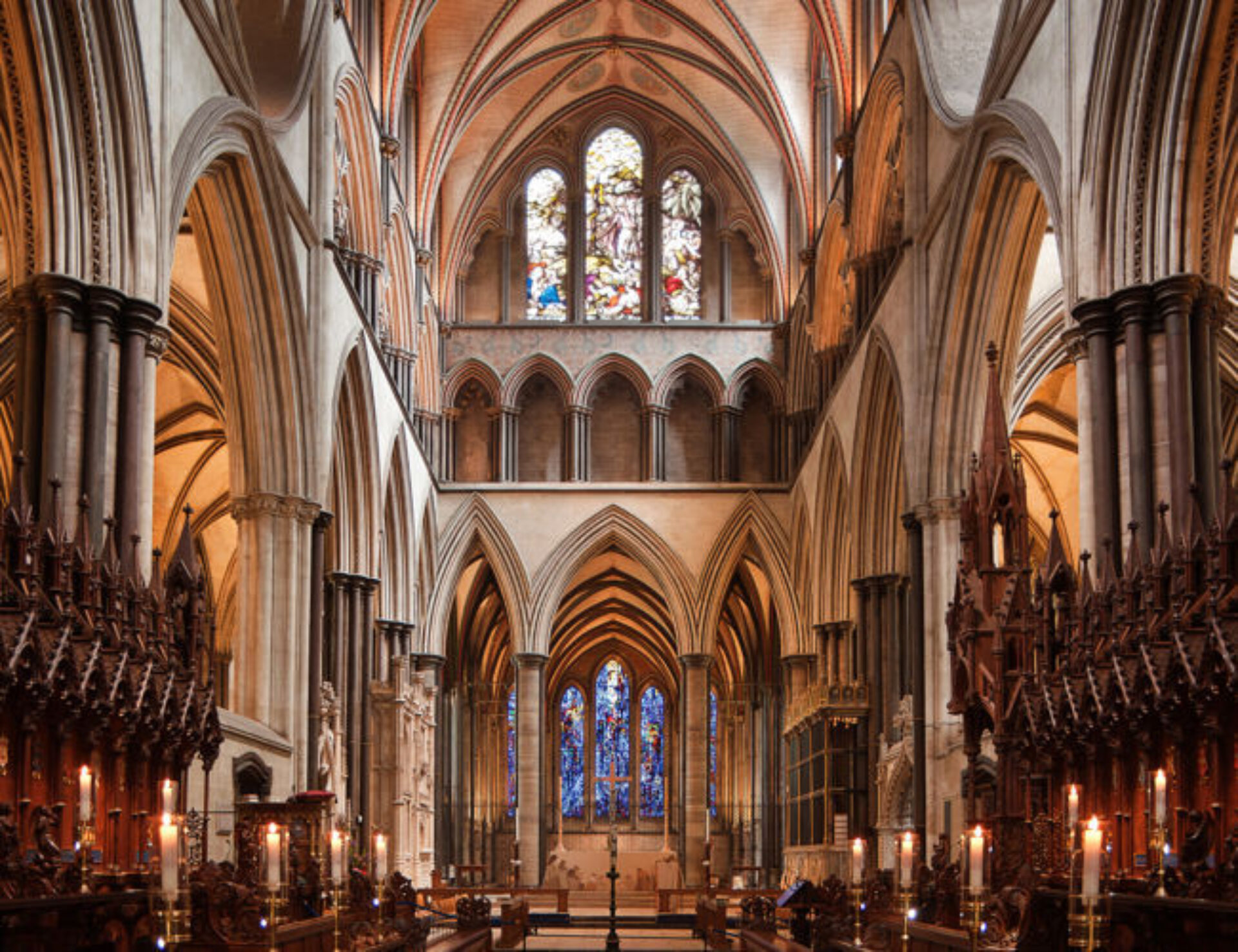
Cathedral Church of the Blessed Virgin Mary, Salisbury, United Kingdom.
“Where it all began: Dr. Marshs’ transformative year at Salisbury Cathedral as a 12-year-old chorister shaped his musical journey, with multiple performances a week.”
Dana Marsh:
That's a really good question. I would say Salisbury Cathedral, because I went there when I was 12 years old as a corester. My dad was on a sabbatical, and we ended up in England for a year. So I auditioned there. That was just an absolutely huge formation experience for me because you'd sing basically eight performances a week, different music at every one, and whatever I might have been lacking in terms of sight reading skill at the beginning saw something of a major transformation by the end of it.
Bella Grimaldi:
Is there a specific memory or experience that really resonated with you or stays with you to this day?
Dana Marsh:
Yeah, quite a few actually. So I was in a boarding school and we had to get up really early in the morning to go over to the cathedral to practice, and we had to walk in step, literally, we had sort of these medieval cape style things on and these four corner tabs, it would look pretty, I guess the word would be dorky to a lot of folks, but it was very traditional. We went over there to rehearse, and I even remember because I was so impressed by the experience that I used to sort of imagine there was a camera in my head and I'd look around at this cathedral that was over 800 years old and think of all the people that had sung there over all those centuries. And actually, I was the first American to actually be a part of that. And I wanted to remember as much as I could because I knew I wasn't necessarily going to have an experience like that again.
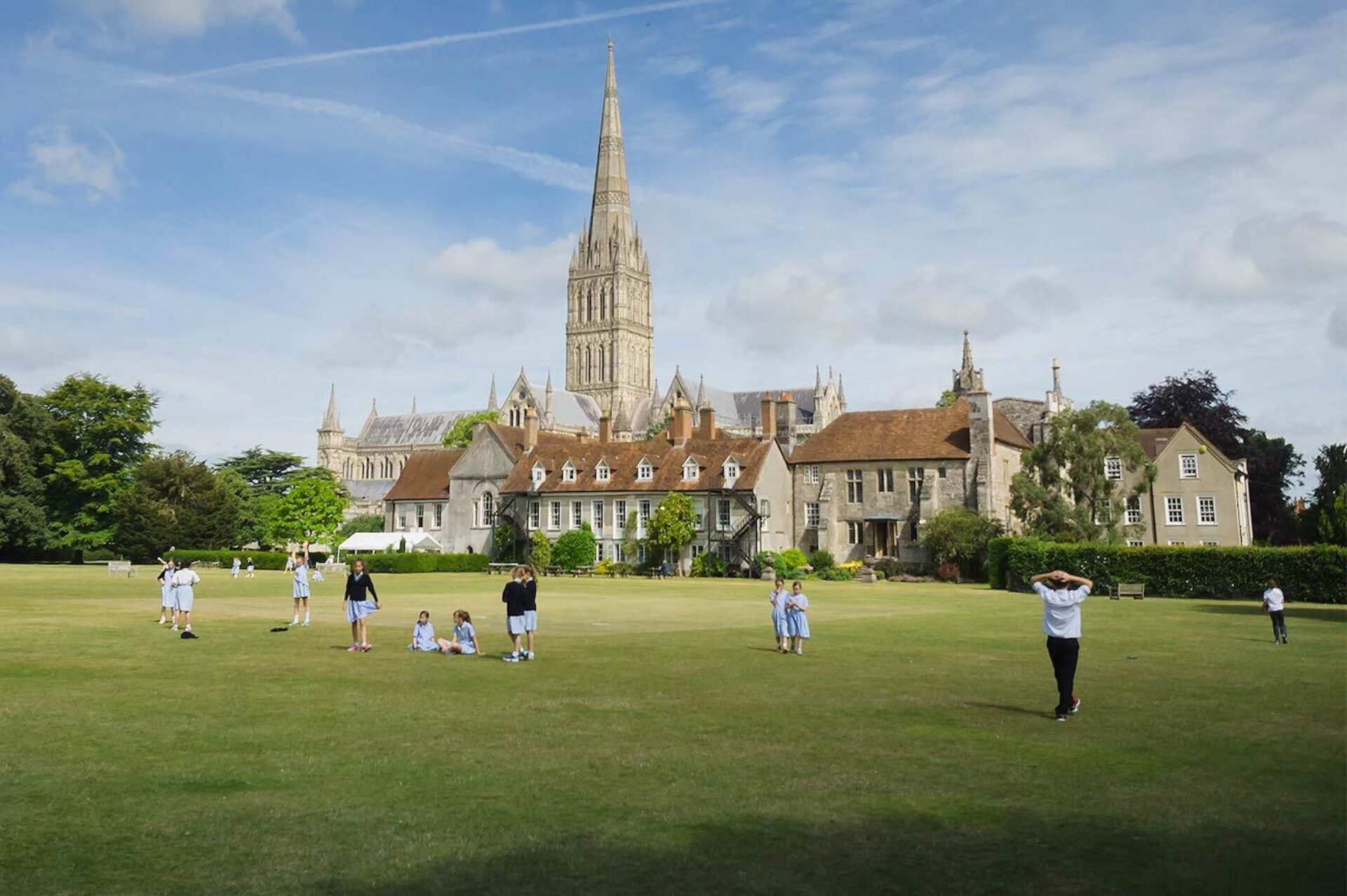
Salisbury Cathedral School, Salisbury UK.
"Early mornings, medieval robes, and centuries of tradition: Marshs’ time at Salisbury Cathedral School was more than rehearsals - it was walking in the footsteps of history as the first American chorister.”
Bella Grimaldi:
So with your role in international collaborations, how do you view the polarity between American and European approaches to historical performances?
Dana Marsh:
That's a really good question. So in historical performance, which is basically, so for example, if you're performing the music of a classical composer like Handle or Bach in historical performance, you perform it on instruments that are models or replicas of the instruments that Bach would have recognized and known and was his toolbox for composing. So think of all the people that might study an instrument as a kid in third and fourth grade, and you keep it going. What you do if you're changing into historical performance is you're actually changing instruments even though it's a different version of the same instrument. So in a certain sense, you have to relearn. So a lot of Americans went over to Europe to learn that and came back and taught. So for example, the person who founded our Historical Performance Institute at the Jacobs School was American. He had what you would call the first medieval music performance group that popularized it, that made it sound really compelling to audiences and really kind of got them into it.
Carolyn Hadlock:
What did he do that made people resonate with it?
Dana Marsh:
Medieval music is a hard thing to be able to imagine how it was performed because it's so long ago. And what we do get from the manuscripts, the notation that we can see only tells us a fraction of the story about how it should actually be performed. We'll never know for sure, but we can tell by reading chronicles that are left behind, it's easier for us to supply the missing pieces to that puzzle in our own way today. I mean, that's what really makes it real is how we are able to supply those missing pieces, and that's what they really excelled at for the first time. And it was just kind of a galvanizing thing, really.
Bella Grimaldi:
So with those different perspectives, American versus European perspectives on historical performance, do you see them as fundamentally at odds or do these differences actually enrich global music making?
Dana Marsh:
It was a brand new thing. Once it became more established, the folks who went over to Europe didn't just come back here to be photocopies of what they learned over there. Right there, they added their own sense of individuality to it. And the interesting thing that you'll find, and I'm kind of summarizing this, but over the last 20, 30 years or so, a lot of the folks that you see who have a really strong interest in the very early musics are also hugely interested in new music and…
Carolyn Hadlock:
New compositions.
Dana Marsh:
Yeah, exactly.
Bella Grimaldi:
So having worked with prominent ensembles like the London Mozarts players, how have those collaborations shaped your perspective on performance?
Dana Marsh:
What I learned most from working with ensembles has as much as anything else to do with just people working with people. I mean, we collaborate in any discipline, whether it's making a podcast like this and dealing with, it could be any production that you're involved in is always going to involve different perspectives, different people, different personalities, different styles that all need to come together and operate sort of on the same frequency, if you will. So it's kind of something we need to even be able to go beyond what we think our own musical knowledge or experience might be, and have as much of a meeting of minds as possible for that matter.
Carolyn Hadlock:
What's the most genre-bending collaboration you've ever done?
Dana Marsh:
Well, very recently actually, I also work with an ensemble in Washington DC of which I'm artistic director. And we made a recording a couple of years ago where the first half of the recording was a major work by JS Bach, but the second half of the recording was a commissioned piece by an absolutely wonderful composer named Trevor Westin, who really has an understanding of earlier musics and the choral genre and all of that sort of stuff. But wanted to speak something that is truly of this moment. One of my colleagues in the Jacob School, Ingrid Matthews, who's a baroque violinist, is also a jazz violinist and does jazz improvisation. And that's one area where jazz and early music actually really meet is that there's a lot more improv in early music than we hear in modern performances. And so I think classical music is working very hard now in a certain sense to recapture some of that characteristic. And there's a lot to be learned from jazz musicians in that area. A jazz musician is improvising along, they know they're bar 12, they know they're in bar 16. So it's that sense of musical space, that sense of having a vocabulary that's always ready to go. There's a lot we can learn within our music discipline.
Bella Grimaldi:
So as a scholar and director, how do you cultivate a space where tradition and transformation coexist and what tensions arise in that coexistence?
Dana Marsh:
That's a really good question. My feeling is if one were to sort of take the temperature of the field right now and the musicians that I see, whether it's preparing for a performance at IU or outside of IU in a purely professional standpoint, musicians these days I think are very, very open to not feeling completely bound to certain sets of rules. I mean, let's face it, all the best composers, whatever the genre and field is really kind of, you're amazed by them because they break the rules in such a way that's credible, that's believable and above and beyond that it gives, what's that number one thing that music gives us, that joy, that communication?
Carolyn Hadlock:
It sounds like there's more latitude for finding the edges inside the music as well as the performance. How is the audience playing into it?
Dana Marsh:
The audience is so important. There are few greater sources of inspiration to a performer than the responses of an audience. And we're very, very lucky in Bloomington here because we've got a very educated audience in Bloomington that goes to, I mean, you figure a place, like even just taking the Jacobs School by itself, there's over a thousand performances a year and a majority of them are free. And then also where I work in DC, that's a town again that has many universities in it. There's a lot of the seated governments. So I work with a Bach ensemble there, and these people show up and they are hanging on every note. They are literally hanging on every note. And for performers, that's as valuable as you d discovering some sort of revelation with the music itself, because that's what truly validates it. We can appreciate it on our own. We can bask in the beauty that we find in the music, but there's something about an audience when they see that too.
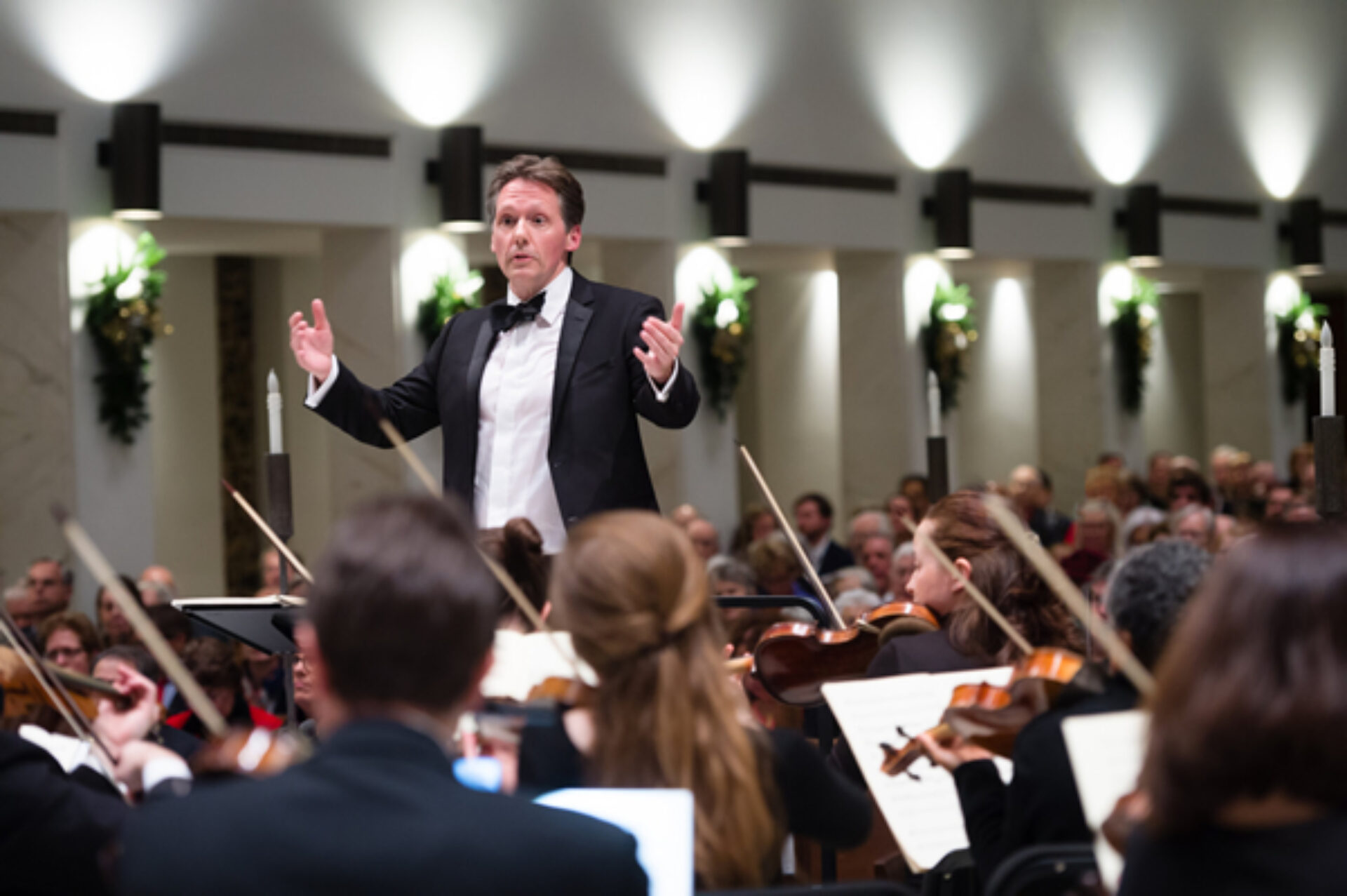
Washington Bach Consort, courtesy Metropolitan Photography.
"The magic of music comes alive through the audience: Performing with the Washington Bach Consort, where every note resonates deeply with an engaged and attentive crowd.”
Carolyn Hadlock:
And it sounds like you're in two geographical areas where there is a lot of appetite and a lot of understanding of those, but how do you introduce that kind of thing to some audiences, to a new audience?
Dana Marsh:
I think a lot of it has to come through, whether it's a university, a school of music, or an arts organization, a lot of it has to come through. One thing that of course has gradually diminished and largely missing from early education is music, because that's kind of what equips us to have that appreciation to begin with. And a lot of schools, Jacobs included, so we have the Office of Entrepreneurship and Career Development that's run by Alain Barker. That gives students a chance because when you're doing a degree, that's kind of the bubble you're in. You don't see anything beyond it, and that's the goal. You just want to get the degree, but it's just a degree. And when we get out there, we need to feel equipped to deal with that and that our career actually is starting as we're at school. So what I try to do, I mean as a faculty, we don't see ourselves as being mentors only for the period of time that they're at the school.
I mean, that continues. That continues, especially for the students that there are students that will stay in touch that need help, might need a letter of support. And we're really, as far as I'm concerned, we're always there. I mean, it's not just a two year thing or a four year degree. We want to help as best we can place students. And in recent years as well as further in the past in our department, we've had students that have just done wonderful things, miraculous things, and it's just such an amazing thing to see because sometimes there might, it's possible to misjudge too. You might see a student that at one point in their career, it doesn't look like things might pan out, but they end up being the ones that surprise you the most. Or it could be the other way around. There could be someone who at first looks like they've got the whole world to be on top of and it might not.
Emily Hook:
What role does the study of polarity play in developing a musician's understanding of diverse musical traditions at Jacobs?
Dana Marsh:
That's great. Yeah, in classical music, Western European classical music, it's been primarily white music, but there's been a real sense of soul searching because there are composers. There's been an incredible focus on women composers in the last 20, 30 years, which has really come to a high point of late in particular. So even you think as you go further back, if marginalized communities are generally being kept out of the picture, how much more so is that going to be the case the further back you go? So this has been a really, really important thing. Also, our orchestras just getting lessons that's expensive and it tends to be for folks who tend to enjoy a certain amount of privilege. So there's a lot of work going on right now making sure that we're making sure everyone has the same opportunity because the music's for everybody, the music's for everybody.
Carolyn Hadlock:
Well, in particular, as you said, the arts in general are being sort of cut from a lot of public education, early education, and that's where the exposure starts. So you're having to play catch up to really sort of do this community outreach to bring all these new voices and the diversity inclusion effort into the school.
Dana Marsh:
Absolutely true.
Carolyn Hadlock:
Do you ever have an instance where a student will bring, I mean a lot of music is being composed on the computer these days or using ai. How do you reconcile that?
Dana Marsh:
That's a really interesting point. I think AI is very definitely a tool, no question about it. Well, I was in Cambridge, England over the summer at a Bach conference and everything from the usual things you'd think would be discussed from manuscript study to AI, figured into the whole thing. It's a great way to brainstorm. It's a great way to just get ideas flowing. I think we don't know yet what the sort of effect of that is going to be, and we know we can imagine what implications there might be, but I don't know. I'm no expert or even vaguely intelligent about it myself. But I would imagine that in the next three years, that is going to mushroom into something bigger than we would've imagined.
Carolyn Hadlock:
If we throw ourselves a hundred years into the future, we're now talking to the person who's doing what you're doing, the director of the Historical Performance Society. What is that person going to say about this genre or this study of music at this moment?
Dana Marsh:
Well, we will be the historical objects. So there's no way in a hundred years that what we do right now might sound very weird or strange or it would just be very odd. So I mean, an example of that would be, it's possible now to listen to a recording, say on an old LP or wax cylinder, even as far back as the late 19th century. So say 1890s, 1900, 1910, and to listen to music then, and none of that would be taken entirely seriously today. So if that's the case only that far back, how much more so would it be when we extend to three, 400 years back?
Emily Hook:
Very interesting.
Dana Marsh:
One thing I should say about historical performance is that as much or more than any other performance discipline, it relies equally on a historical understanding of the past, which means an academic element, a research element is there, but there's also the practical performance area. And the thing is you can't live without either, and they're equally important. So this is the great challenge and the great craft that students in our area need to be working on. If one has trouble getting into the academic side, you need to kind of follow your nose and see what performance it is that really excites you so that you want to get a little more under the surface of it, and that starts to make you more of an authority. The longer you do it, the more experience you have with it. So at the end of the day, if you've really kind of done your homework as it were and done your research, you do have the license at that point to depart from it as you will because it's a truly educated move.
Emily Hook:
In what ways does your leadership encourage students to explore the contrast between past and present in their artistic development?
Dana Marsh:
Our field, I used to talk about, well, it's more authentic if you play it on this instrument, or it's more authentic if you play it this way. But authenticity isn't, again, it's not a document, it's not a book. I mean...
Carolyn Hadlock:
It's still an interpretation.
Dana Marsh:
Right. It's a very laden term, which I probably shouldn't even use, but authenticity say in the art world is whether that's a real painting or not, et cetera, but what makes it real has to be something in our own time. Even 18th century writers will say that unless you are totally convinced passionately about what you're doing, there's no way your audience is going to be moved along with that. So that's the most important element to a successful performance in historical performance or HP, as we call it. That also has to be joined with a certain understanding of the music as well from its original context.
Grace Sheeley:
How do you strike a balance between scholarly accuracy and artistic expression in these moments?
Dana Marsh:
Well, the two should be able to meet, the two should be able to cohabit. It is something that one can feel a polarity between, but the challenge for the performer is to reconcile that in a way that's entirely natural and entirely organic and feels actually made up on the spot, even though there's, on the other hand, beneath it been so much going into it over such a long period of time, it needs to feel absolutely of the moment and an expression of who you are and how that music speaks through you is really the thing.
Carolyn Hadlock:
One of the things, this seems like a bit of a tangent, but I know in Indianapolis, one of the things they were trying to do to sort of make the Symphony Orchestra relevant was you could go see Star Wars or you could go see a film and then it would be this. So the Symphony Orchestra playing it. What are some ways in which you are using the program that you're the director of the institute to help cross over those timelines in entertainment genres?
Dana Marsh:
This is kind of an aside as well, but one interesting area. Lots of people are, the gaming industry is so huge. It's immense, absolutely immense. Well, there's a ton of medieval music in the gaming industry now, and I would say that over the last five to 10 years or so, a lot of that genre has become much more familiar through
Carolyn Hadlock:
Interesting
Dana Marsh:
Gaming.
Carolyn Hadlock:
It's even Zelda and Fortnite, a lot of those, there's a lot of medieval.
Dana Marsh:
I have a friend who actually, he's the executive director of Early Music America, which is sort of the main trade organization in our field. He is involved in. He founded Co-founded a medieval music group that has been doing some soundtracks for gaming.
Carolyn Hadlock:
That's amazing. And he doesn't see that as a step down or a sellout.
Dana Marsh:
Oh, it's incredibly fun. Not at all. Not at all. And what a great way, just like getting folks into a symphony hall to watch Star Wars with all the reality of having those instruments right there. This is a similar kind of thing because I would wager that gaming goes on more hours than a film store.
Grace Sheeley:
How can a performance feel authentically historical, yet speak powerfully to modern emotions and cultural context?
Dana Marsh:
We've got about seven horn players at Jacobs that are learning on pre valve horn instruments. That's a lot of plumbing to sort of work your way through. Yeah, I think this idea of authenticity and having something emotional to say with the impact, again, comes back to one's individuality, and it's where your individuality and informed interpretation meet and where those meet, that's where the magic happens.
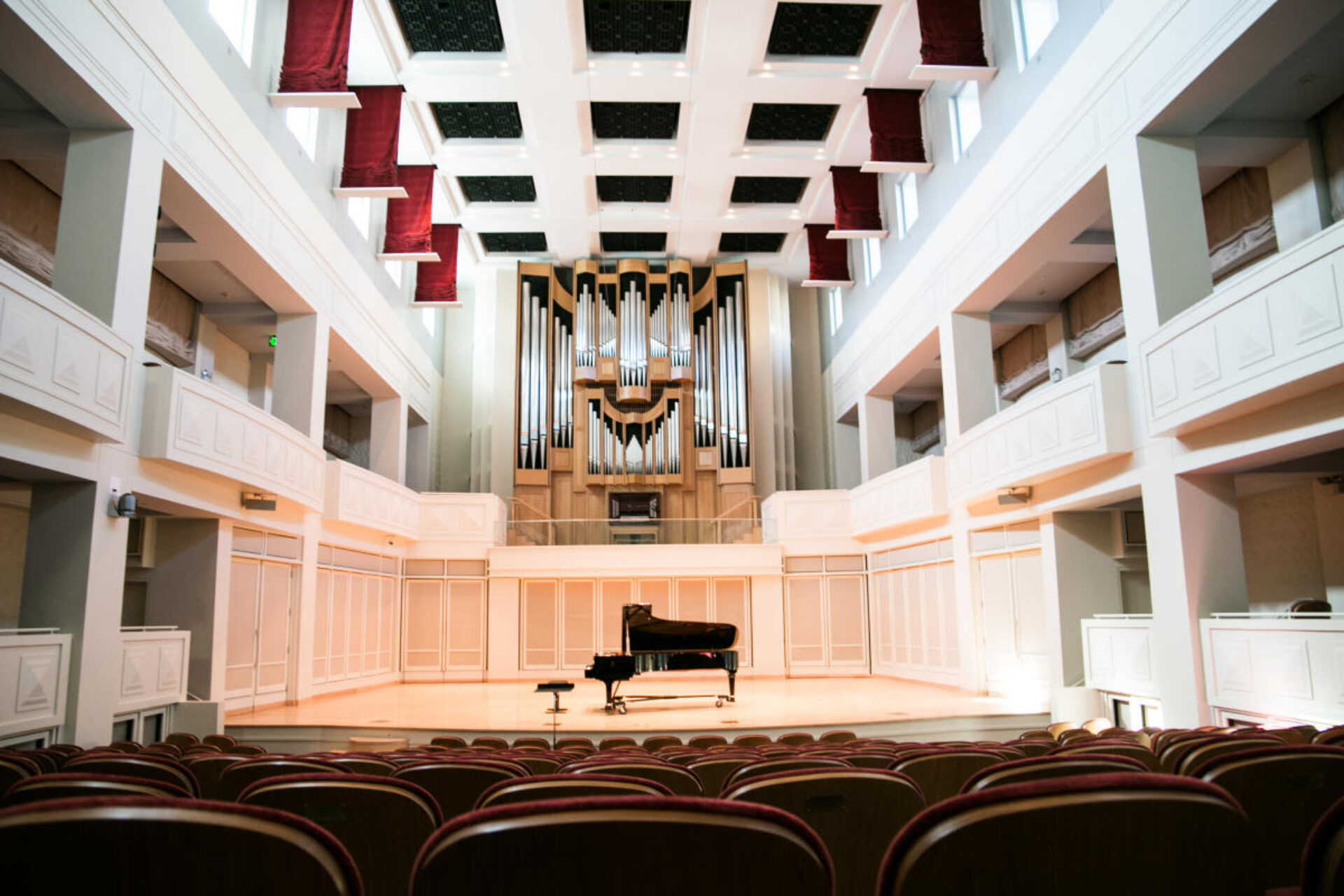
Auer Hall, Jacobs School of Music, Indiana University of Bloomington.
"Where tradition meets innovation: Auer Hall at Jacobs School of Music is where individuality and informed interpretation come together, creating performances that honor historical authenticity while speaking powerfully to modern emotions."
Grace Sheeley:
Totally. I always would practice my music and make sure I could feel the emotional impact, and then when we would perform it on stage, being able to see how the audience reacts to it was really
Carolyn Hadlock:
What do you think, how do you think music can help reduce polarity as a society?
Dana Marsh:
I think it does so by the nature of what it is. As a case in point, again, not only the work that I've experienced here at IU, but in a place like Washington DC where you have an ensemble that emphasizes the music of JS Bach, but you're going to find every possible political representation following that you can imagine, because it's kind of many people who are music appreciators, universality, there's a different effect that music has on everybody because of the way it's put together. It just pushes buttons on everybody no matter what perspectives they're coming from. And so because of that, I think music, whatever it is, that's just a small narrow example, but whatever that music is has the ability and possibility to bring what might be other kinds of social polarities or whatever have you really, that creates music is the common ground when it comes right down to it.
Grace Sheeley:
Do you believe there's a point at which historical accuracy should take precedence over accessibility or vice versa?
Dana Marsh:
I think there are times and places for both. It depends on the situation really, I'd say, and the performers involved, and where they might want to stretch the boundaries and try something different.
Carolyn Hadlock:
I think that's an interesting takeaway. I came into this particular interview, and I think we were all sort of leaning into this space of society today, values today, divisions today. And I think what I've been hearing, which is really interesting, is it's less about the collective and more about the individual and how they see that performance.
Dana Marsh:
Right. And if you're in a group, say a chamber group, that there's always got to be a meeting of minds there too. So it's as collective as it is individual and vice versa, depending on the setting.
Bella Grimaldi:
Yeah. Excellent. I think that's it, but thank you so much, professor. This has been really interesting conversation to have.
Dana Marsh:
It's been an honor to be invited. Thank you very much. I really appreciate it. Thank you. Thank you so much.
Thank you so much for listening to this episode. This episode was created and produced at the IU Media School as part of the Beautiful Thinkers Podcast, IU edition. To follow along this season, check out at the Beautiful Thinkers on Instagram and LinkedIn. Special thanks to Bella Grimaldi for our music and the students who researched and recorded this episode, Grace Sheeley and Emily Hook.


